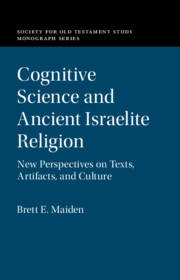Book contents
- Cognitive Science and Ancient Israelite Religion
- Society for Old Testament Study Monograph Series
- Cognitive Science and Ancient Israelite Religion
- Copyright page
- Contents
- Figures
- Tables
- Acknowledgments
- 1 Intuitive and Reflective Cognition, Optimal and Costly Religion
- 2 Rethinking the Popular–Official Religion Dichotomy
- 3 Deuteronomic Theology as Cognitively Costly Religion
- 4 Counterintuitive Mischwesen
- 5 On Artifacts and Agency
- 6 Ritual and Cognition in Leviticus 16 and the Day of Atonement Ritual
- 7 Conclusion
- Bibliography
- Index of Biblical Texts
- Subject Index
2 - Rethinking the Popular–Official Religion Dichotomy
Published online by Cambridge University Press: 17 September 2020
- Cognitive Science and Ancient Israelite Religion
- Society for Old Testament Study Monograph Series
- Cognitive Science and Ancient Israelite Religion
- Copyright page
- Contents
- Figures
- Tables
- Acknowledgments
- 1 Intuitive and Reflective Cognition, Optimal and Costly Religion
- 2 Rethinking the Popular–Official Religion Dichotomy
- 3 Deuteronomic Theology as Cognitively Costly Religion
- 4 Counterintuitive Mischwesen
- 5 On Artifacts and Agency
- 6 Ritual and Cognition in Leviticus 16 and the Day of Atonement Ritual
- 7 Conclusion
- Bibliography
- Index of Biblical Texts
- Subject Index
Summary
This chapter reframes the traditional dichotomy between popular and official religion and argues that ritual practices in both official and domestic settings were informed by intuitive conceptualizations of supernatural agency. As an alternative to popular and official religion, the categories cognitively optimal and cognitively costly religion are proposed as a fruitful framework for understanding the diversity of religious expression in ancient Israel. It is argued that from the standpoint of human cognition, ritual offerings performed in both popular and official contexts share deep structural features in common − whether in households, villages, local shrines, or state-sponsored temples. The final section of the chapter evaluates the recent shift to the study of family or household religion in ancient Israel. An analysis of material artifacts and religious ritual practices in domestic and official contexts reveals interesting points of continuity across these domains. Overall, a cognitive perspective suggests that the difference between home and temple, ancestors and the national deity, may not have been as great as it is sometimes imagined.
Keywords
- Type
- Chapter
- Information
- Cognitive Science and Ancient Israelite ReligionNew Perspectives on Texts, Artifacts, and Culture, pp. 29 - 63Publisher: Cambridge University PressPrint publication year: 2020

